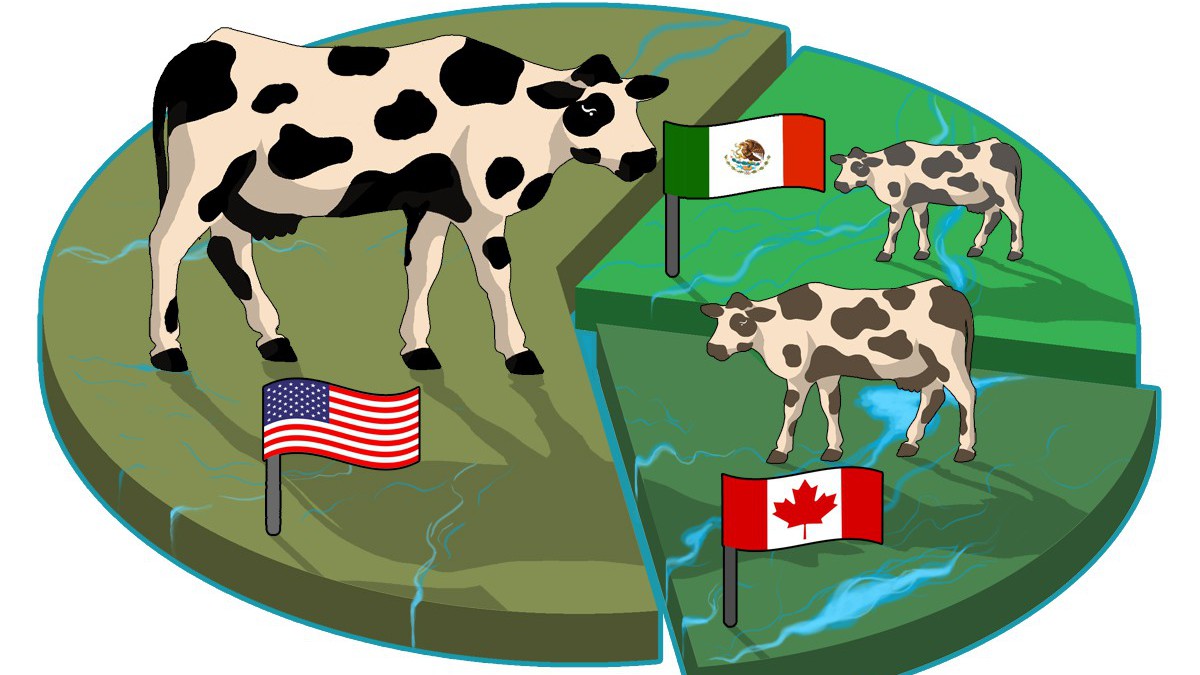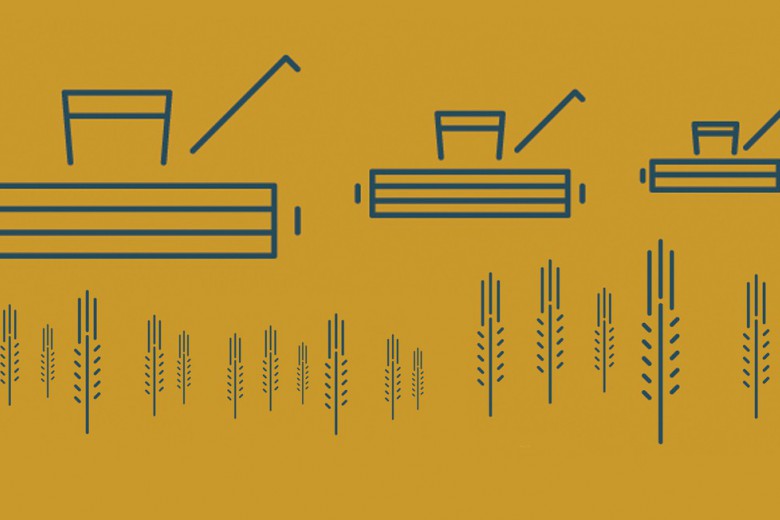In the 1960s and ’70s, Canadian farmers were in crisis. Farmers producing perishable products like dairy and eggs were trapped in a boom-or-bust cycle by powerful processors and distributors, who would wait until large quantities of perishables came on the market and then pit farmers against one another in bidding wars to force prices down. Farmers were forced to sell their products for less than they cost to produce, because distributors could simply refuse to buy them. The result was shortages of perishables for consumers, as well as a disastrous loss of income for farmers.
This crisis was met by a nearly 20-year-long countrywide campaign of protests, letter-writing, educating consumers, lobbying, and farmer solidarity. Out of it was born Canada’s supply management system, which maintains a consistent supply of goods for public consumption and ensures that farmers receive a price for their products that has a realistic relationship to the cost of production. Supply management has become the envy of other countries, like the U.S., in which price volatility and inconsistent supply impact both farmers and consumers.
Since the early 1990s, neoliberal free-trade agreements have been relentlessly chipping away at supply management and other agricultural policies, like quality control for grain exports, which are crucial to maintaining incomes for family farmers in Canada. Since Trudeau, Trump, and Peña Nieto shook hands over the new NAFTA agreement, those chips have gotten bigger. Dairy farmers are hit particularly hard in the new agreement, with U.S. farmers gaining access to an extra 3.9 per cent of Canada’s dairy market. It brings the total of imported dairy on supermarket shelves in Canada up to almost 20 per cent of the national supply, says the advocacy group Dairy Farmers of Canada.
This crisis was met by a nearly 20-year-long countrywide campaign of protests, letter-writing, educating consumers, lobbying, and farmer solidarity.
Worryingly, much of this U.S.-produced dairy will be from cows that have been injected with Bayer’s (formerly Monsanto’s) genetically engineered bovine growth hormone, rBGH. rBGH is illegal in Canada but used widely in the U.S. dairy industry, which also receives grain and other subsidies that Canadian farmers don’t enjoy, and makes U.S.-produced dairy products artificially cheap compared to Canadian products. In Canada, it’s the supply management system that allows Canadian farmers to get sustainable incomes for their products without needing to rely on government subsidies in the first place.
It took a social movement to create supply management 47 years ago. Today, it seems unlikely that anything short of that level of solidarity and tenacity will succeed in defending it.
The NFU leads the fight
The new NAFTA agreement is officially called USMCA (U.S.-Mexico-Canada Agreement) or CUSMA (Canada-U.S.-Mexico Agreement), depending which side of the international pissing match you’re on. But it has raised howls of protest from family farm organizations in all three countries. Canadian farmers face attacks on policies that have long protected the Canadian agricultural sector from the price volatility that is so common in the U.S. and Mexico, and which provides for higher labour and environmental standards on Canadian farms than in the other two countries. Many of those policies, including supply management and import/export controls, were adopted as a result of decades of organizing on the part of farmers themselves. One of the staunchest pillars of that organizing for the last 50 years has been the National Farmers Union (NFU).
Formed in 1969 when provincial farmer organizations banded together to strengthen their position in relation to policy-makers in Ottawa, the NFU is the only direct-membership voluntary organization of family farmers in the country. They take no sponsorships or funding from either government or industry, and their policies and programs come from their membership of family farmers across the country. That independence and grounding in farmers’ real lives and struggles is the source of their power and, with NAFTA 2.0, that power is needed more than ever.
That independence and grounding in farmers’ real lives and struggles is the source of their power and, with NAFTA 2.0, that power is needed more than ever.
Civil society groups like the Council of Canadians have lauded the removal of Chapter 11, the portion of the old NAFTA agreement that allowed corporations to sue governments if regulations negatively impacted their expected profits. But it’s not all good news – the new agreement establishes a Committee on Competitiveness and a Committee on Good Regulatory Practices, made up of government appointees from all three countries, which will look for ways to harmonize regulations across the three countries. They must have a process for any “interested persons” to approach them with an application to change existing policies or prevent new policies from being adopted. The agreement defines a “person” as “either a natural person or an enterprise” – meaning that corporations are being given a permanent seat at the regulatory tables of all three countries.
This regulatory harmonization, alongside the parts of the new agreement targeting the Canadian dairy and grain export sectors, represents a serious corporate power grab in Canada’s agriculture sector.
To the NFU’s director of research and policy, Cathy Holtslander, the new NAFTA is really just more of the same. “We have a fundamental disagreement with trade agreements that put control over what we need for life in the hands of corporations,” she tells me. One of the central frameworks that guides the NFU’s work is food sovereignty: building food and agriculture systems whose goal is to produce healthy and culturally appropriate food for people through ecologically sound and sustainable methods in which farmers and eaters hold the decision-making power.
“When we look at these trade agreements through the lens of food sovereignty,” says Holtslander, “we find that they’re not compatible.” This incompatibility exists at the heart of NAFTA 2.0 – food and agriculture can’t be treated like other commodities because they’re vital to life. But it also extends to specific policies within the agreement, like the erosion of supply management.
“We see supply management as an institution of food sovereignty for Canadians,” says Holtslander. “So when you look at what’s in this latest deal and you see that Canada has let the U.S. have a say over our dairy policy, that’s a pretty blatant loss of democratic control and national sovereignty,” she explains.
“That’s a pretty blatant loss of democratic control and national sovereignty.”
To counter policies like the new NAFTA, the NFU has put the knowledge and experience of family farmers at the centre of food and agriculture policy. “All of our policy positions have come from our grassroots members, based in their experience, the problems they’re having, and the things they’re doing that are good models for how we want things to be done,” says Holtslander. “They represent the collected wisdom of our membership over many years.”
The union is organized into seven regions, each of which brings the concerns and best practices directly from their members to the regional conferences, where that collected wisdom is formalized into policies. Those policies and practices then go to the national conference, held each November, where members from across the country come together to discuss, debate, and agree on shared concerns, best practices to promote, and policies for which they want to lobby.
Julie Enman is a board member in NFU Region 8, British Columbia and the Yukon. She sees the collective power that farmers have through the NFU as critical. “One of the reasons farmers are so often shortchanged is that outside of a farmers’ market, we are not visible in urban spaces,” she says. “People often forget about the valuable and needed services we provide.”
Enman says that the NFU provides a unified voice that backs up grassroots work with lobbying power. “Farm issues vary so much regionally,” says Enman, “but share some common themes. It’s important to make those connections, and voice them across the spectrum of this humongous empty country that we live in.”
From the grassroots
“Because food issues are farm issues and farm issues are food issues, farmers and non-farmers have many goals in common,” says Dianne Dowling, of the Kingston, Ontario, local of the NFU. Translating opposition to corporate control of the food system at the national level into action at the grassroots level is a long-term process of making community connections. “In the early 2000s, in an effort to be proactive in helping farm families improve their net incomes, our local began to focus on projects that could build the local farm and food economy,” says Dowling.
That work brought farmers and eaters together in ways as diverse as local food feasts, producing a local food directory to help the public know where and how to get local food, many public meetings, and a Local Food Summit to educate the public about food and farming issues. It led to the creation of a Local Food Declaration that forms the basis for the area’s food policy, as well as an organization, Loving Spoonful, that works to increase access to healthy food in the area. The cumulative effect of these kinds of actions, taken over time, creates a more solid farm economy, which helps farmers be less beholden to corporate-controlled economics.
“Because food issues are farm issues and farm issues are food issues, farmers and non-farmers have many goals in common.”
“In our local,” says Dowling, “members support each other by sharing equipment, helping with work, and socializing together, and we have a very supportive community of non-farmers who buy our products and get involved in food and farm concerns.” That stability allows farmers to resist being pushed around by distributors, processors, and other capitalist entities that would otherwise have a stranglehold on farmers’ livelihoods.
This kind of grassroots work fits into the larger framework of food sovereignty and agroecology that guides the NFU’s policies nationally. Combatting the corporatization of the food system often looks like promoting alternatives that prioritize ecologically produced food for consumption by local communities. The NFU sees agroecology as a political framework. Within it, the farm-as-factory model – which puts more power in the hands of corporations and leads to fewer, larger farms – is replaced by a farm-as-ecosystem model that puts power back in the hands of farmers and the communities they serve.
Scaling up
At first glance, it might seem like the NFU’s two tactics are in opposition. On one hand, they support small-scale farming at the grassroots level. On the other hand, they advocate for policies like supply management and export/import controls that support much larger farms, which, while still run by families and not corporations, are producing for distribution in the supermarket or the export market.
“I don’t think there’s as much tension as it might appear at the surface,” Holtslander muses. “Agroecology doesn’t have to be really small scale. You can still have an agroecological approach to, say, grain farming. If we talk about agroecology as working with nature, and keeping our production based more on loops than on extraction, it’s absolutely possible to do larger scale farming that way.”
Enman agrees. “I think a lot more has to be done around sustainability and production practices, regardless of scale,” she says. “For example, much of B.C. has suffered from drought and forest fires, without doubt connected to climate change. Farmers, particularly cattle farmers, are often painted as the top emitters of greenhouse gases, but folks using holistic and agroecology practices often aren’t producing such high emissions.”
“Agroecology doesn’t have to be really small scale. You can still have an agroecological approach to, say, grain farming.”
She says she sees greater unification between farmers across the country on issues like water consumption and tackling climate change as important parts of the vision moving forward for the NFU. She hopes that both farmers and consumers will realize that practices that meet these ecological goals are also an important part of pushing back against trade deals like the new NAFTA. “Whether people realize it or not, these issues are connected.”
Dowling sees the federal government’s focus on corporatizing agriculture for competitiveness in the export market as one of the key issues that the NFU is fighting. “I am very disappointed in the federal government’s preoccupation with exporting Canadian products, including agricultural products. About one in eight Canadians are food insecure – we should be focusing on getting our food products to Canadians, not pursuing the race-to-the-bottom world of international trade.”
Holtslander agrees, and sees the NFU’s ability to act collectively to influence policy as crucial to shifting the balance of power in that economic system back into the hands of farmers. “We do have export agriculture in Canada and it covers a large land base,” explains Holtslander. “It’s important not to abandon these large tracts of arable land to corporate industrial agriculture. We need to fight for that land base to be under the control of human beings rather than corporations. To do that, we need to maintain institutions that give farmers a say.” In day-to-day terms, that means working in local communities to connect farmers to the eaters who rely on their products, while also lobbying at the policy level to restrain the corporate influences that make maintaining those direct connections so much harder.
“Act like it’s a petting zoo and talk to people. Let the cows mow the legislature lawn!”
Ultimately, the work of combatting the corporate attack on family farms lies where it always has, in the hands of farmers and the communities that support them. Enman says that now is the time for farmers to make themselves visible in urban spaces – like the tractor-led protest against the new NAFTA, organized by Quebec’s farmers’ union in Montreal in November, that included thousands of urban dwellers brandishing kitchen utensils and pushing shopping carts. “Load up the cows and other critters and take them for a city stroll,” says Enman. “Act like it’s a petting zoo and talk to people. Let the cows mow the legislature lawn!”
Organizations like the NFU can provide the larger framework of policy and solidarity, and can pressure state agencies with the power of their many voices. But ultimately it’s up to all of us to connect with and support the farmers that feed us if we believe in the vision of food sovereignty for our communities. Farming is a slow and steady way of living, and the fight to protect a sustainable farming sector will always be similarly incremental and specific to each place and time. Organizations like the NFU, with a national reach and the capacity to work at the policy level, can amplify the voices of farmers and community members, helping us to fight the battles that are too big for us to take on alone.
“Our basis is solidarity,” says Holtslander. “It’s amazing the strength and confidence that it gives people, because they know they’re part of something bigger.”





_780_520_90_s_c1_c_c.jpg)
